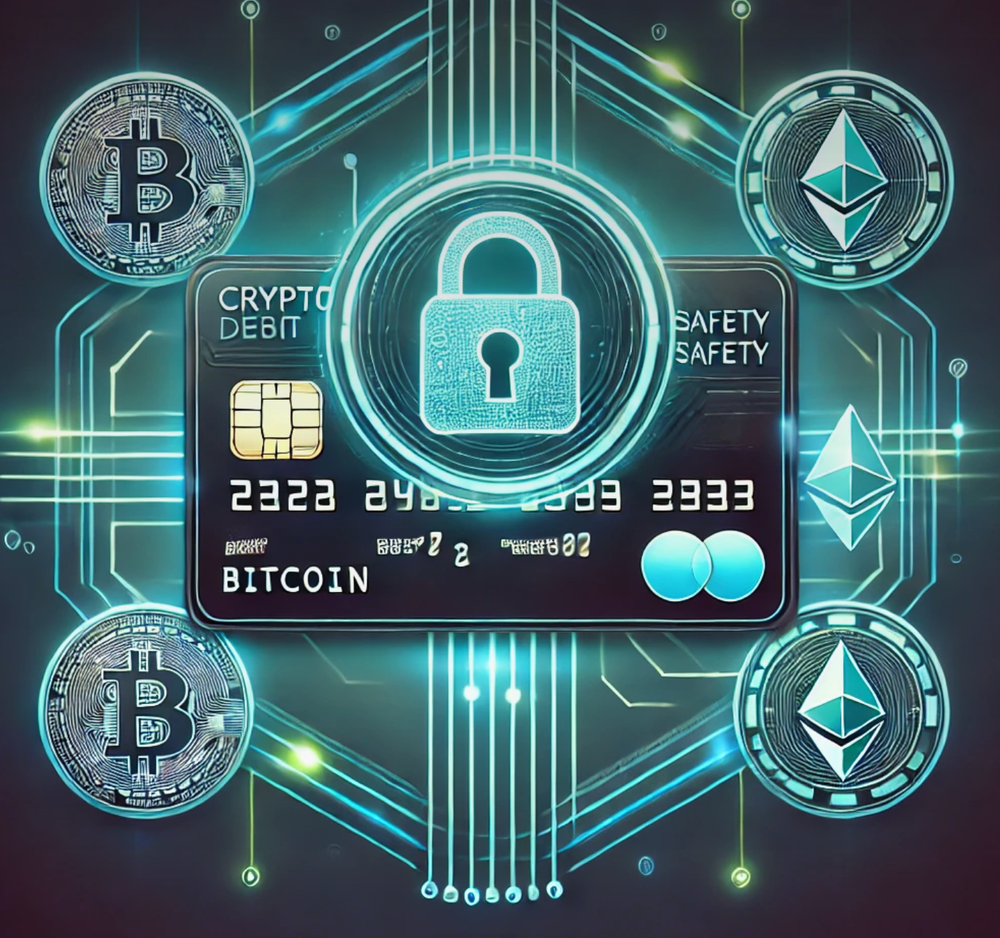
A crypto credit card featuring the logos of Bitcoin and Ether, symbolizing digital currency transactions.
Are Crypto Cards Safe? How to Avoid Risks
A couple of decades ago, we could not even imagine that technology in the financial sector would go so far that there would be a non-fiat currency that we could use on a daily basis. In recent years, crypto cards have become a popular tool for conducting transactions and managing cryptocurrency in everyday life. Paying with a crypto card abroad is extremely convenient, such cards, as a rule, offer lower fees and cashback on favorable terms in cryptocurrency. Of course, crypto cards have certain risks, where would we be without them. Where there is big money, there are always thieves who want to steal it. That is why in this article we want to talk about what risks may await us when using crypto cards and how to protect ourselves from various kinds of threats.
What are crypto cards and how do they work?
Crypto cards are payment cards that allow you to use cryptocurrency for purchases, cash withdrawals and other financial transactions. At the time of the transaction, the cryptocurrency is converted into fiat currency at the current rate. Crypto cards are supported by popular payment systems such as Visa and Mastercard, which allows you to use them everywhere.
Advantages of crypto cards for shopping and traveling:
- No hidden fees for international payments.
- Instant currency conversion at the current rate.
- Cryptocurrency cashback, for example, 1-3% for purchases.
- Security: the ability to freeze the card through the application.
Major security threats
But not everything is so sweet and smooth, as long as there are people ready to steal other people's money, any finances become vulnerable, especially when it comes to big money. We have prepared a list of the main threats associated with crypto cards:
Cyberattacks on crypto wallets and cards
Many crypto cards are linked to crypto wallets, which makes them a target for hackers. In the event of a successful attack, intruders can steal both cryptocurrency and card data. In 2023, crypto services lost more than $ 1 billion because of cyberattacks.
Private Key Leaks and User Data
A private key is like the key to your heart, it should never end up in the wrong hands. Otherwise, a crypto thief will be able to take over all your wealth and dispose of it at own sweet will. Research shows that by 2023, the number of data breaches has increased by 47.8% compared to last year.
Phishing and Social Engineering
Phishing is the scourge of our time, a trap for the inattentive, which poses a serious threat to your savings on a crypto card. Fraudsters create fake websites and mailings to lure out card and crypto wallet data. In 2023, about 22% of all cyber attacks were related to phishing. Not much, not little, but this is a fifth of all cyber attacks.
Platform and Smart Contract Vulnerabilities
DeFi platforms often use smart contracts to automate transactions. Vulnerabilities in their code can lead to theft of funds. In 2023, more than 54% of DeFi attacks resulted in losses of over $428 million.
Incident Examples and Statistics
In June 2023, a major hack of Atomic Wallet occurred, resulting in users losing $129 million. This was one of the largest incidents of the year. Hackers also actively attacked centralized exchanges and DeFi services. For example, centralized exchanges lost $330 million in 2023, while losses on DeFi platforms reached $428 million.
How to choose a safe crypto card?
When choosing a crypto card, you should pay attention to the following criteria:
- Support for two-factor authentication (2FA): Cards with 2FA, such as CrossFi, provide additional protection.
- Transaction limits: Limiting the amount of transactions reduces the risk in case of a data leak.
- Insurance: Good old insurance will cover up to $100,000 if you get caught by scammers.
- Availability of a freeze function: Click “block” and the thief will be left with nothing.
Practical tips for protecting your funds
1. Use two-factor authentication (2FA)
Two-step authentication is something familiar and native. We often use this level of protection by default, but just in case we want to remind you that even if an intruder finds out the password, without the second factor he will not be able to access the card. And applications such as Google Authenticator or Authy are more secure than SMS codes, which can be intercepted.
2. Keep the bulk of your assets in cold wallets
For storing large amounts of cryptocurrency, it is better to use cold wallets (offline devices). They are not connected to the Internet, which eliminates the risk of hacking.
3. Set up transaction notifications and spending limits
Enable instant transaction notifications via the app or by email. This will allow you to quickly respond to suspicious transactions.
Spending limits (e.g. daily or weekly) will limit potential losses if your card is hacked.
Example:
Set a spending limit of $500 per day. Even if an attacker gains access to the card, they will not be able to withdraw all the funds at once.
4. Update passwords and use unique combinations
Using the same password on different services is a common mistake. Regularly update passwords and use unique combinations for each platform.
5. Phishing protection: check websites and links
Fraudsters often use phishing attacks, disguising fake websites as official services. Never enter card or wallet details on suspicious websites.
6. Regularly check your transaction history
Often, users notice theft of funds too late. Regular transaction monitoring allows you to identify unauthorized transactions in time and block the card.
7. Use multi-signatures for large transfers
Multisig requires the approval of a transaction by several keys. This reduces the risk of theft of funds, since one compromised account will not give an attacker access to all assets.
8. Avoid public Wi-Fi networks to access wallets and crypto cards
Public Wi-Fi networks are Lucifer in the flesh. Crypto card users should know this cold. And if possible, use a VPN for a secure connection when working with cryptocurrencies.
Conclusion
Crypto cards are a really convenient way of payment for a very large percentage of the population, from young to old. Crypto cards are especially relevant for citizens of the world who very often move around the planet and have the need to pay for goods and services here and there. But, in addition to the happy owners of the opportunity, there are a number of countries and their citizens who are under sanctions and are forced to turn to alternative methods of paying for goods and services abroad, crypto cards are their lifesavers. And if you live abroad and are forced to send money to relatives in another country, a crypto card is generally a must have. Yes, of course, there are some risks, but if you observe security measures and follow recommendations for storing large assets, then problems with losing money can be avoided.


